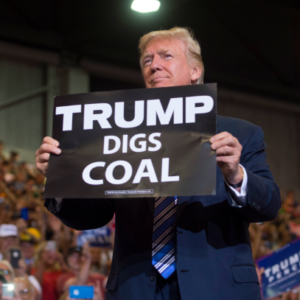Recent news stories and columns might have left you with a misleading impression about the Trump administration’s efforts to roll back landmark energy standards and environmental protections.
You might think that these regulatory rollbacks are happening in broad, unthinking defiance of corporate demands — motivated solely by knee-jerk anti-government ideology or brutish incompetence. But scratch beneath the surface, and you’ll see there’s more than meets the eye.
It’s true that the Trump administration is packed with extreme, anti-government ideologues and has a record of incompetent policymaking. It’s also true that some of President Trump’s deregulatory actions have drawn vocal opposition from big industry players.
But what’s false is the notion that ideology and incompetence are driving the administration’s deregulatory agenda.
The reality is that there’s always some narrow corporate interest group, industry lobbyist or greedy CEO with unprecedented White House access asking for deregulation against the public interest.
In virtually every case, the attacks on energy standards and environmental safeguards are happening in direct response to corporate lobbying, and those with the most access are getting just about everything they want.
Consider a few examples:
Marathon Petroleum, the American Fuel and Petrochemical Manufacturers and the American Legislative Exchange Council had a major hand in the clean car standards rollback. A separate industry campaign on Facebook, covertly run by an oil industry lobby representing Exxon Mobil, Chevron, Phillips 66 and other oil giants, urged people to write to regulators to demand lower clean car standards.
The recent methane rollback came at the direct request of the Independent Petroleum Association of America, whose members and supporters were caught on tape giddy with laughter at their unprecedented access to the Trump administration. They even booked the Trump Hotel as the base of operations for their Beltway lobbying event last year.
Some of the rollbacks, such as repeal of the mercury pollution standards, came at the direct request of big coal CEO Bob Murray. Murray Energy sent the Trump administration an action plan in March 2017, and most of the items on his “wish list” have been carried out. Others, including the weakening of the Clean Power Plan and downward revisions to the social cost of carbon calculations, came at the request of the National Association of Manufacturers.
It’s true that some big industry players have opposed these moves, despite continuing to privately work with big business trade associations that are supportive of the rollbacks. The fact that these deregulatory moves have garnered any industry opposition at all reflects just how radical they really are. But that opposition is driven by industry concern with public relations and corporations’ preference for regulatory predictability.
For example, while some auto manufacturers recently entered into a deal with California to adhere to the state’s higher fuel efficiency standards, it was industry itself that prodded the Trump rollback in the first place — blanching only when it became clear that a rollback would lead to a protracted confrontation with California and potentially years of litigation and uncertainty.
It’s also true that some business groups, such as the American Sustainable Business Council that represents small business across the country, are broadly opposed to the administration’s deregulatory agenda.
But what’s false is the notion that the Trump administration is attacking energy and environmental safeguards unilaterally, driven purely by incompetence, cluelessness and knee-jerk anti-government ideology in broad defiance of corporate demands.
The truth is that there’s almost always a corporate lobbyist or CEO with unprecedented access to the administration asking for more deregulation, and it’s virtually always against the public interest.
Why does this matter?
Well for starters, it’s always important for journalists to get the story right, and it’s especially important in this era of “fake news,” right-wing disinformation and conspiracy-mongering. But it also matters because of what it reveals about the right’s broader, long-term push against our nation’s system of regulatory safeguards.
When it comes to building public support for deregulation — or diminishing public resistance to it — it’s easier to get people to swallow otherwise dangerous, unpopular and inhumane policies if you can fool them into believing these actions somehow serve the public interest. It’s also easier if people believe you’re acting on principle — motivated by a set of high-minded philosophical or ideological precepts.
That there’s virtually always some greedy corporate lobbyist or sleazy CEO behind each deregulatory move proves that neither is true. The facts show that the Trump administration’s regulatory rollbacks are serving narrow private interests, not public ones, and they’re being driven by increasingly narrow corporate demands, not broad philosophical principles or ineptitude.
Clearly, there are deregulatory true believers in the administration — ideological extremists such as Trump’s acting chief of staff Mick Mulvaney, who never met a rule he didn’t want to repeal. And it’s at least conceivable that ideologues like Mulvaney still might push to roll back public protections even in the face of unanimous industry and public opposition. But that’s not what’s happening now, as the recent press coverage might have led you to believe.
Instead, the administration’s deregulatory generals and foot soldiers are taking their marching orders from the most shameless, ruthless and rapacious CEOs and lobbyists and rolling back energy standards and environmental safeguards at an accelerating pace.
And when you consider the right’s anti-regulatory, anti-government philosophy in this context, it’s hard to escape the conclusion that their ideology is just disingenuous cover story whose real purpose is to rationalize and facilitate self-serving paybacks to the wealthy, powerful and well-connected.
In other words, what’s happening isn’t really a story about incompetence or ideology, though it’s taking place amid both. Corruption is still king. And maybe it always has been.

